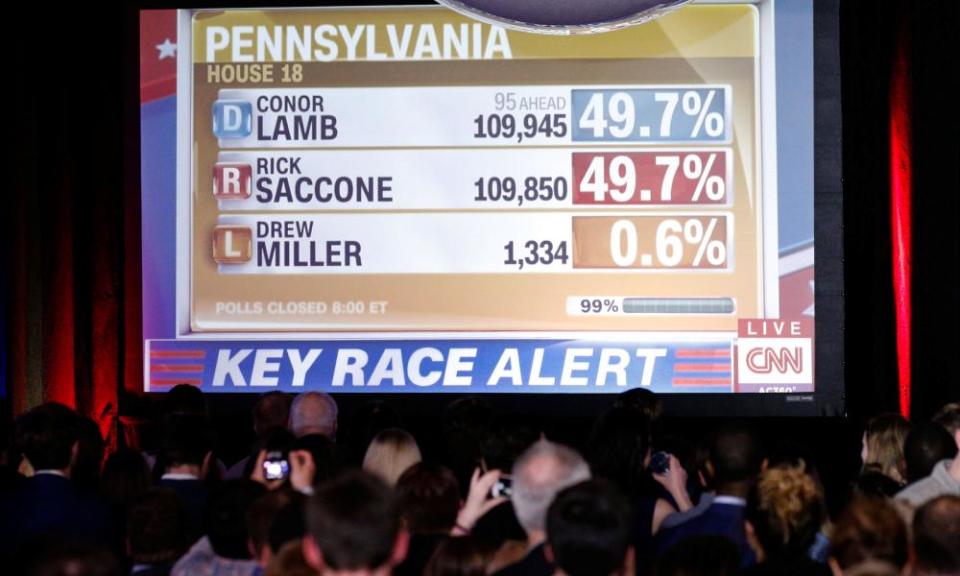The pendulum is swinging back to Democrats. Will it stay that way?
The resistance is strong after Pennsylvania’s special election. What happens when there is no Trump to resist any more?

There is always the danger of reading too much into any one election. Pundits and partisans try to divine the future through individual performance and assign momentum to one party or the other. Every election seems like the most important ever.
So it goes with all special elections for congressional seats in the Trump era. Tuesday night’s was significant, however, regardless of whether Democrat Conor Lamb ultimately takes Pennsylvania’s 18th congressional district over Republican Rick Saccone. (The result isn’t out yet, but Democrats have already declared victory). The two men, in a virtual tie, played the role of bellwethers for each of their parties.
Lamb, given his performance, clearly came out ahead.
The 33-year-old former marine and prosecutor matched Saccone, a state legislator, in a district Donald Trump won by nearly 20 points. Democrats hadn’t bothered to contest it in past cycles: Republicans won eight straight elections and the seat only became vacant once Republican Tim Murphy resigned after an extramarital affair and allegedly asking his mistress to have an abortion despite his pro-life views.
Democrats all year have been outperforming the partisan leans of open congressional districts, one indication of a growing blue wave this November. Like Republicans raring up for the Tea Party wave of 2010, right in time for Barack Obama’s first midterm, Democrats are now fired up against a president who is remarkably unpopular with everyone except self-identified Republicans.
Lamb is a moderate. He opposes abortion and abhors strict gun control laws in a suburban and rural district that hasn’t been hospitable to the left. It’s a district that also won’t exist much longer – the Pennsylvania supreme court struck down the state’s current congressional map as too gerrymandered in favor of Republicans. New district lines favorable to Democrats have been imposed.
While Lamb outraised Saccone, the Republican benefited from heavier spending. Outside Republican groups poured in over $10m to defend Saccone and attack Lamb in a race that, just a few months ago, wasn’t believed to be competitive. Republicans can’t afford to spend so much on otherwise safe turf this year.
If the outcome of this race demonstrates anything, it’s that Trump can only do so much for Republicans when his name isn’t on the ballot. His cult of personality isn’t transferable to the party. A raucous rally in the district, which like any Trump event ultimately served to feed his ego rather than prop up the candidate he was there to help, could not propel Saccone to obvious victory in a district he was supposed to lock down.
This isn’t a problem unique to Republicans. In the Obama era, Democrats couldn’t muster much when their president didn’t appear at the top of the ballot. American politics is now predicated on backlash – a negatively polarized country perpetually voting against the other side, hoping desperately for single-party rule.
The pendulum now swings in the Democrats’ favor. Republicans run the country but they won’t forever. It’s simple mathematics.
For Democrats and progressives and anyone who prefers not see oligarchs and the most retrograde forces in society call the shots, the question is what’s next. Anti-Trump fervor can drive Democrats into a majority, but it won’t keep them there. It’s a sugar rush: nice for today and entirely ephemeral.
Now is the time of good feelings. The resistance is strong. What happens when there is no Trump to resist anymore? Will Democrats grow complacent again? Will they allow districts like Pennsylvania’s 18th to return to safe Republican rule? Or will they seize power and keep it?
No special election has the answer to those questions.
Ross Barkan is a journalist and candidate for the New York state senate

